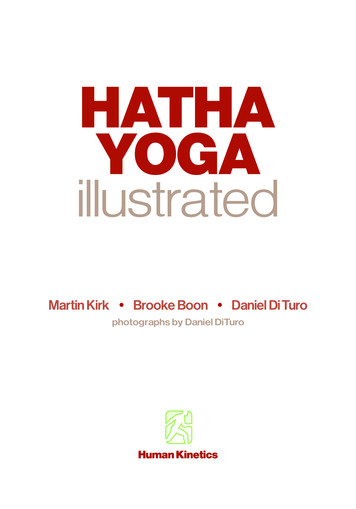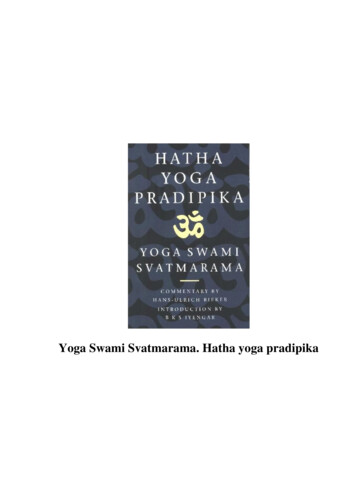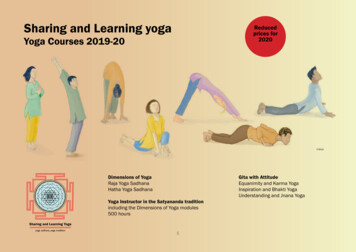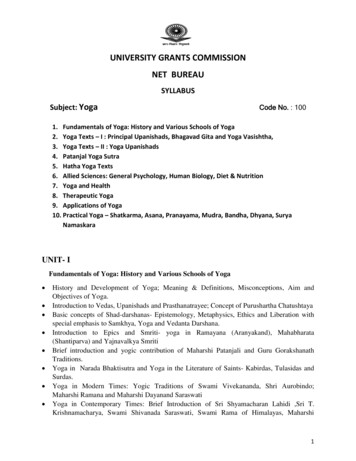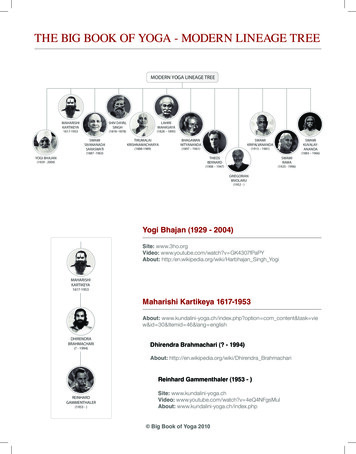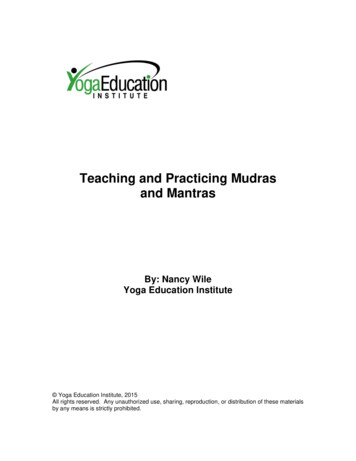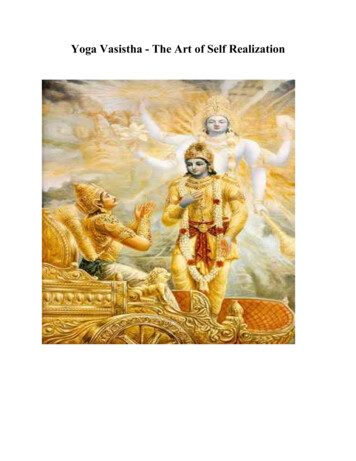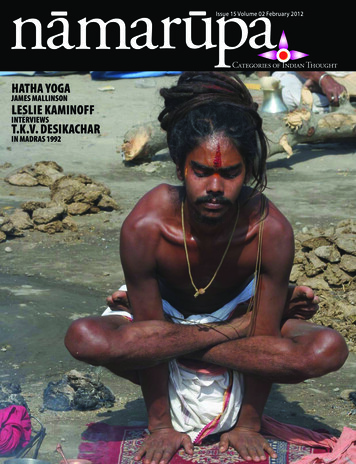
Transcription
Issue 15 Volume 02 February 2012HATHA YOGAJAMES MALLINSONLESLIE KAMINOFFINTERVIEWST.K.V. DESIKACHARIN MADRAS 1992
Publishers & Founding EditorsRobert Moses & Eddie SternAdvisorsDr. Robert E. SvobodaMeenakshi MosesJocelyne SternEditorsMeenakshi MosesEddie SternDesign & ProductionRobert MosesEddie SternDiacritic EditorsVyaas HoustonAssistance fromDeborah HaradaWebsiteMatt AlexanderKendal KellyRobert MosesISSUE 15 VOLUME 02 FEBRUARY 20121. LESLIE KAMINOFF INTERVIEWST.K.V. DESIKACHAR IN MADRASOCTOBER 1992.Originally posted to e-Sutra on April 24, 19992. HAŢHA YOGAJames MallinsonPublished in Nāmarūpa with the kind permission of Brill,Leiden, Netherlands. “Haţha Yoga,” in: K.A. Jacobsen et al., eds.,Brill’s Encyclopedia of Hinduism, vol. III, Leiden, 2011, 770781. (http://www.brill.nl/encyclopediahinduism)Cover: Jagannāth Dās Jī Yogirāj. Kukkuţāsana. Haridwar KumbhMela 2010. Photograph by James MallinsonअaSri K. Pattabhi JoisSri Swami Vishnu-devanandaNÄMARÇPA uses diacritical marks, as per thechart shown to the right, for the transliteration of allSaêskäta words. While many of the articles do contain these marks, it is not a universal occurrence in themagazine. In those cases where authors have electednot to use diacritics, Saêskäta words remain in theirsimple, romanized form. Chart by Vyaas �a �ऐaiॡĺलlaसsa ��naमmaFebruary 20121
LESLIE KAMINOFF INTERVIEWST.K.V. DESIKACHAR IN MADRASOCTOBER 1992Last week I returned to thiswonderful interview for inspiration,and realized it’s been nearly 20 yearssince this extraordinary meeting with myteacher, T.K.V. Desikachar. The conversation took place during a month-longvisit to Madras in the fall of 1992. I washaving private sessions with him almostevery day, and it was a time when I waswrestling with some deep doubts aboutthe most fundamental philosophicalissues in Yoga philosophy. Desikacharknew this when I approached him requesting an interview. In retrospect,the invitation I offered that he presentat the 1993 Unity in Yoga Conferencewas merely a pretense to open the conversation. I knew he would never agreeto attend but the conceit of asking himOriginally posted to e-Sutra on April 24, 1999to address a large imaginary future audience lent a timeless quality to many ofhis remarks.Two senior students, Adrianna Rocco and Paul Harvey, were also presentwhen the interview was recorded inan upstairs office in Desikachar’s family home. Paul’s assistance was invaluable in helping me prepare some of thetrickier questions and I’m pretty sureDesikachar was able to tell which questions were more Paul’s than mine.Upon returning from Madras inthe Fall of 1992, I recruited my friendEddie Stern to help with the difficulttask of transcribing Desikachar’s wordsinto a legible document. I can still picture Eddie sitting at the desk in my oldapartment on East 7th Street, typingT.K.V. Desikachar’s office where the interview took place.2Issue 15 Volume 02away on my original Macintosh SE30.When he was done with the raw transcription, it took several more editingpasses for me to massage the text to itspresent form.It’s only fitting Namarupa re-publishthe interview on its 20th anniversaryfor its readers. I write this in the firsthours of my 54th birthday and it willbe the best possible gift that my teacher’s profoundly practical insights havean opportunity to resonate as stronglyfor you as they have for me.Leslie KaminoffGreat Barrington, MAMarch 13, 2012Adrianna Rocco and Leslie Kaminoff inMadras, April 1999
This is an amazing interview,and well worth reading. In it,Desikachar and I talk about a wide rangeof subjects, including the relationshopbetween Yoga and Hinduism, theview of ego in Yoga, the difficulty inpreserving tradition, Patanjali’s view onthe inevitability of suffering, and thefuture of Yoga in America. Originallyposted to e-Sutra on April 24, 1999(Present also were Paul Harvey andAdrianna Rocco.)DESIKACHAR: Last week, Leslieinvited me to deliver an address at thebig Unity in Yoga conference in Mayof 1993. The theme of the conferenceappears to be about honoring the peoplewho did so much for Yoga for the last100 years, and also looking forwardto the future of Yoga. I suggested thatinstead, maybe we can do somethinghere in Madras, as it is easier because weare both here now.LESLIE: So I have prepared a fewthings DESIKACHAR: Please.LESLIE: As you’ve just mentioned, nextyear in America we’ve chosen to view1993 as the hundredth anniversary ofYoga in America. The reason for thisis that 100 years ago in September of1893, Swami Vivekananda presentedVedanta philosophy to a large audienceat the World Parliament of Religions.What would you say to the Americanyogis about the past century of ourinvolvement in Eastern teachings,particularly as it all started with a VedantaSwami presenting to a parliament ofreligions.DESIKACHAR: Well, I am amazedat this interest. In fact, I didn’t knowit was a 100 years ago that our greatmaster Swami Vivekananda went toyour country and spoke. All I can say isit reflects upon that interest in Americaabout our great heritage. Having learnedso much from the West, I want to thankthe West for the interest. Because of theirinterest, we have learned a lot about ourown heritage, so I am very grateful.LESLIE: You mention that heritage,yet however there does seem to be acontinuing intermixture of Vedantaand Yoga in the way it is presented inthe West. There is a Hindu religiousassociation with Yoga that many teachersare promoting, whether implicitly orexplicitly. So I’m curious about what youwould want people to know regardingthe distinction your tradition makesbetween Yoga and Vedanta.DESIKACHAR: When I was anengineer, Leslie, my boss was fromDenmark, and we always thought hewas an expert in structural design,because he was our boss, and this was acompany where we were experts in theconstruction and design of structures.Today it is the best company in Indiaand I always thought that he was anexpert in my field, which is structuralengineering. So only later I came toknow that he was an expert in fisheries!It seems the only way he could cometo India was as as an expert in a fieldwhere we don’t have experts! (laughter)So, he got his work permit to cometo India and he was our “structuralexpert”. I never knew he was a fisheryman. So what I’m trying to say is thatwhen people come to our country fromthe West, we assume many things -theyknow a lot about technology -they areexperts in computers -they are verygood in English -they know everythingthat the West represents-et cetera. Oftenwith these expectations they try to liveup to them, so we can’t blame thembecause we expect them to be like that.Perhaps they don’t want to disappointus. I think this works both ways – youknow the more ignorant we are themore this happens. But the facts doremain that Yoga is a different system,Vedanta is a different system, and thereare six such systems based on the Indianheritage called the Vedas, and we don’tdeny that Vedanta is one such systemwith Hinduism, but it is not Yoga.I must say again and again that fordifferent reasons, including this stresson Hinduism, the Vedanta Sutras refuteYoga. Because of the attitude Patanjalihas about God, for example, creation,etc. .so Vedanta Sutras refute Yoga. Thesutra is “Etena yogah pratyuktah”(V.S.Chap.II, Sec.I, Sutra 3). So there is aclear cut distinction between Hinduism,Vedanta, and Yoga.LESLIE: What is the literal meaning ofthat sutra?DESIKACHAR: “By what we haveexplained, we have refuted Yoga.” Whatthey have said is that Yoga speaks aboutIshvara as a teacher, but Yoga doesn’t sayGod created this world, Yoga doesn’tsay everything goes back to God, Yogadoesn’t say there is one thing and onlyone thing and that is God Brahma.This word Brahma doesn’t exist in YogaSutra, so these are very fundamentalissues. These issues are important forthe Vedantins who believe in the realityof the one Brahma. Yoga doesn’t haveeven the word, let alone talking aboutwhat Brahma is. Patanjali’s Yoga talksabout Ishvara as a possible entity, maybethe best teacher, the first teacher, but hedoesn’t speak of a God who created thisworld. He only speaks about what weshould do with the mind, and if Godhelps my mind as a point of focus,then O.K., God is fine with me, if Goddoesn’t help my mind, forget aboutGod, look for something else. This is noteasy for a Hindu like me. I am surprisedthat this is not obvious for many peoplebecause these presentations are notmy presentations, not even my fatherspresentations, not even from 100 yearsago. Vyasa spoke about that in hisVedanta Sutras (200 A.D.?). This is veryimportant for us to emphasize that Yogais not Hindu religion. Yoga is a systemthat helps the mind and Hindus mayuse it as they have been, and anybodycan use it.LESLIE: Atheists can use it , Agnosticscan use it DESIKACHAR: Yes, yes. Krishnamurthiused to practice Yoga. People who rejectall systems have practiced Yoga. I hope Ihave made myself clear, and I am sorryfor this confusion. My sincere apologiesthat we Indians have not made thisclear.February 20123
LESLIE: A related question also couldpertain to the different concepts of ego.There seems to be confusion about theconcept of ego both from the Yogicperspective and the Western perspective.Is it possible for you to clarify what ismeant in Yoga by the term ego or theterm that gets translated as ego, andwhat role it plays in the process andeventual goal of Yoga.DESIKACHAR: Regarding thesequestions, my reference is Patanjali. Iwant to make this very clear because thatis the text on Yoga. There are thousandsof ancient texts on Yoga but the mostimportant text, the most accepted text,the fundamental text on Yoga is Patanjali.So my response is now based on histeachings, the very practical teaching ofPatanjali. Now, because of the proximitybetween Patanjali’s speaking and what isknown as Samkhya, which is anotherof our schools, somehow this word egohas entered the field of Yoga. As far as Iunderstand even if I myself have said it,there is no word called ego in Yoga. Theword ego itself does not appear in theYoga Sutra of Patanjali. Does it ?LESLIE: AreAhamkara?youreferringtoDESIKACHAR: There is no wordAhamkara in Yoga Sutras. You go fromthe first sutra to the 195th sutra – thereis no Ahamkara in the whole Yoga Sutra. Some people have used that word, butit is not Patanjali’s fault.LESLIE: Has Vyasa used that word inhis commentary? DESIKACHAR: Yes, that is what Imean some people might have usedit .I might have used it, but accordingto the authority (Patanjali) there isnothing. But there is an interestingconcept in Yoga and that is association:I associate myself with certain things.For example, “I am the son of a greatYogi, you know”, this is an association.“I am a very educated person.” “I havebeen teaching Yoga for so many years”,“I am an expert”, and so on. We allhave these associations. Now these4Issue 15 Volume 02associations could be good associationsor bad associations. For example, Ican say, “I am very lucky to have theblessings of my father”, these are alsoassociations. “When I think of him Iam nobody, he is so great and I am verysmall”, this is a type of association. SoPatanjali talks about these associations,the good associations and the badassociations, Asmita, it is called Asmita.So this Asmita could be good, couldbe bad. Now often the word Asmita isconfused to be ego, so when you studythe Yoga Sutras you learn that we havegood association and bad association.For example, if I am in a state ofmeditation, I’m completely absorbedin the object of my meditation thisalso called Asmita. So it is the goal ofmy life to be in that state. Suppose Ihave become used to a certain way ofbehaving, losing my temper, gettingirritated, this is also an Asmita becauseI am strongly associating to some ofmy bad klesas that are considerednot worthy to be kept. Patanjali’svery intelligent about this. First, henever used the word ego. Second, hetalks about mind only. Mind withgood associations and mind with badassociations. One is desirable, one isnot desirable. So in Yoga we don’t evenhave this problem.LESLIE: So, Yoga would speak merelyof a collection of associations betweenthe mind and some objects, but not adistinct identity or entity in and of itselfwhich can be isolated as an ego. Am Iunderstanding correctly ?DESIKACHAR: I don’t think egocan be just taken out of my pocketand kept here. I would like to see ademonstration where ego can be takenout of my pocket and kept -”This ismy ego.” Because the word Ahamkaraitself was defined by my father as“where something that is not me isconsidered as me.” According to this,to understand ego I have to understandmyself. I have to understand what isnot myself. How many people havethe good fortune to understand that?So without understanding that howcan I even take it out of my pocket andthrow it anywhere? So in Yoga we arenot worried about this question. Weare quite happy that we don’t have anego problem!LESLIE: That having been clarified,what then does the Yoga of Patanjalihave to say about the nature of anindividual’s identity?DESIKACHAR: Yes, that is possible.We have identity and these identitiesare associated with what has happenedto us in the past and what we thinkabout ourselves. How far this identityreally represents my true nature- thatis basically a peaceful nature, a state ofbeing where there is some happiness,where I am clear about things-I don’tknow. So identities could be two: wrongidentity and right identity.LESLIE: And the right identity isbasically DESIKACHAR: Yes. Wrong identityfor example is for me to assume thatbecause: I speak English, I have been toa technical education, I am very smart inpublic relationships, and I have a lot ofstudents, I begin to believe that maybe Iam even better than my father. After all,he did not go to engineering college, hedid not speak English, he does not haveas many students as I have, he neverwent abroad like I did and he doesn’thave the fat bank account that I have,so he is nowhere near me. This is a falseidentity.LESLIE: Aren’t you glad I wont quotethat out of context?! (laughter)DESIKACHAR: You can do anythingbecause it is black and white and I haveno ego problem. (laughter)LESLIE: Well, speaking of egoproblems, in your broad experiencethese last 20 or 30 years teaching bothWestern and Indian students one onone, have you found that the conceptof surrendering the ego is helpful orharmful for people when they get thenotion that surrendering is somethingthat will bring them peace?
DESIKACHAR: Many people havetried it. It has not worked.: (laughter)DESIKACHAR: The problem, whetherit is Indians or others, is because, “Whatis it that I am surrendering? I don’t evenknow what I am surrendering!” If itis my army, I know. It is like in a warwhen what happens is we surrender tothe winner. So, we take the sword or thegun and we place it at the feet of theother man.LESLIE: That’s clear DESIKACHAR: Yes, you can take aphotograph or a video like in Bangladesh.We often saw how the Pakistani armyhad to surrender to the Indians. Wehave that in war, but even then it isnot clear sometimes. This is not a veryhappy situation and I’m sorry if peopleare trying to surrender and then feel badabout it because first, they don’t knowwhat they are surrendering and secondlythey feel they have surrendered. Youcannot really verbalize these phenomenabecause it is something much deeper.Let me give you an example. Some ofmy friends have promised to give upcoffee. I also do semi-medical workas you know Leslie, where we advisepeople about a few things and forexample in some cases we say, “Maybeyou have such a bad liver and youmust give up coffee because it has sideeffects.” So they say, “Sir, when you sayit is for my own health I am ready todo anything! I am so sick I am ready togive up anything!” I say, ” Oh please ifyou cant give up don’t give up becauseI am a very practical person.” Theyreply, “Yes, no problem sir. I can giveup!” The next day they tell their family,“No more coffee!” One or two days goby and then you know what happens?The smell of coffee pulling you – andeverybody’s taking coffee – and peopleeven offer you coffee – and you want thecoffee – but then you have given it up!So you see for one day, two days, threedays, you succeeded to give it up, butslowly, even before you realize it, coffeeis coming to you and then you finallytake the coffee. Now you feel like a thieftaking your own cup of coffee! What ashame that you have to feel like a thieftaking your own cup of coffee! Thenyou go and meet the teacher and hesays, “So, no coffee?” Now you have twochoices. One is you tell a lie and feel badabout it, or two is you tell the truth andfeel bad about it. So many times peoplefeel so bad. Not because I asked them togive up coffee, they wanted to give up,but they just couldn’t. So the questionof surrendering is like this. I must verymuch inside be prepared for this tohappen. It is not simply like giving upa blank sheet of paper- it is not possible.This is why in India great teachers likemy father have said the act of surrenderis the last stage of a person’s life. It iscalled Prapatti. Prapatti is not possiblefor a young boy. One has to go througha lot of evolution – one has to suffer alot – one has to experience life – one hasto enjoy life, and then one has to buildup devotion. Then, maybe at the end ofthe whole story, maybe surrendering isfinally possible. So it?s a long project ?it?s not a one-day project for that to bereally an act of surrender.LESLIE: I guess you must actually havesomething there that you have contactedin your life in order to give it up.DESIKACHAR: Yes. Well, as you saidthe other day, “I can only give up what Ihave and what I know.” If I don’t have itand I don’t know, my giving up is a falsething like when the politicians say theyare not corrupt – it is not true.LESLIE: So if we were to make a radicalstatement here, could we say then thata useful way for people to practice Yogawould be for the purpose of creating astrong, integrated ego or identity?DESIKACHAR: Without using theword ego, because I know very littleabout that.LESLIE: Identity perhaps then.DESIKACHAR: All I want to say is;“I must know something about myselfbefore I know what I’m doing withmyself.” That I would say.LESLIE: This reminds me of a discussionPaul (Harvey) and I were having lastevening. The question we wanted toask you is this; “Do you feel that in theWest the role of Yoga is emphasizing orneeds to emphasize wholeness ratherthen transcendence?” Since the topicof this interview is the future of Yoga,would you like to see Yoga teachers inthe future more be understanding ofthis need for developing an integratedidentity?DESIKACHAR: What I would liketo say about this is to confess that Idon’t have the authority to say what isthe best thing for the West. I am fromIndia, and I can only speak for myself. Ican say what Yoga has done to me. Yogahas helped me to discover my tradition,both the greatness and the weaknessof my tradition. Yoga has helped meto know something about myself - mygood side and my bad side. Yoga has alsohelped bring me to my teacher. BecauseI cannot say Yoga is something I couldhave picked up myself. I had the help ofa great teacher. My associations with myteacher include having stayed with him,lived with him, washed him, and learnedfrom him. What Yoga has also done isreduced to some extent my bad sideand it has really given some hope thatI have a good side. It also has made mehappy to learn that my Indian traditionis very great. It has a lot of good thingsand I also know a lot of things of mytradition have no relevance today. Thisis my discovery through Yoga. How canI answer what Yoga can do for the West?Only the West can answer this.LESLIE: What are some of the thingsyou’ve discovered about your traditiondon’t seem to be useful for you, and whatdo you think of the notion of preservinga tradition primarily because it is old?DESIKACHAR: For example, the typeof discipline my father went through Iam unable to do. Obviously the facultieshe had I don’t have and probably willnever have. At 90 years what he coulddo with his body -I don’t think I’m ableto do it now! So also, the way he wouldexpress his devotion to his God – sittingFebruary 20125
and offering his prayers for hours – Iam not able to do this because my lifeis so different from his. While I respecthim, I don’t live like him. Between myfather and myself, there is a gap of 50years, and Yoga is a very old tradition –at least 1000 years, so how can I claimto represent the Patanjali Sutras when Icannot even represent my own teacher?So many things that he expressedthrough his life are not possible for me.Many things that he did are irrelevantto me. He spoke in Sanskrit and I speakin English. Look at these simple things:I used to sit on the floor with him – Iam sitting with you across the table.So things are changed and that is whathe always said: “Things are changingmany things, many things.” You seemy father’s photograph – he wouldalways have his mark on his forehead,he had a tuft, he would wear a shirtonly when it was very cold. I don’t havea forehead mark. It doesn’t make anysense to me – I don’t have a tuft becauseI never had one and I’m 90% Westernercompared to my father. I wear Westernclothes, I speak English. So it’s clearmuch has changed though I have lotof respect for the tradition, the detailsof tradition have lost their meaning.When I see my colleagues and mystudents it is important to rememberthat something like this always happenseven within India. So, I am now givingyou a model where here is a father, ason and student, and there is a lot ofirrelevance at every stage. At the sametime, there is something constant –that is, we want to improve ourselvesand we want to learn something aboutour tradition. There’s something goodhere, and probably we can help peoplethrough this tradition, but not in words,not necessarily even in deeds, but inspirit. Regarding preserving traditions,I don’t understand how I can preservethe tradition of my grandfather becauseI have few palm leaves on which myfather’s father had written some wordsin a language I don’t understand. Myfather would read them, cherish them,and he would keep them very carefully.This is something he had received fromhis father, and now I have kept it, butit doesn’t make any sense to me, you6Issue 15 Volume 02know, so I cannot keep this tradition.There is a sheet a paper in which abeautiful verse is written in the way ofmy father. He kept it alive by reciting it,meditating on it. Now I am just keepingthe sheet of paper, and in fact, if youask me where it is, I would have to sayplease give me three days because I haveto search for it. So how can the presentpreserve the past? I don’t understand – Ican only - as has been said – protect thecontainer. Paul was giving the beautifulexample of a container, and preservingthe dead container very beautifully.What is inside, I don’t know and I don’teven know if something exists inside, sowhat is it I am preserving if it is an emptyvessel? Preserving the container withoutthe contents is like a museum. You knowI am not talking about archaeologists, Iam talking as a living person – a personwho is living in the present.LESLIE: That’s a very good analogy. Ithink many people have become cultural,religious, or Yogic archaeologists ratherthan people who are capable of creatingsomething by themselves in the present.I’m assuming that what was available tothe rishis, or the great teachers of thepast is still available now at this momentthrough our own creative efforts.DESIKACHAR: Yes- that is the basicidea of Parampara. Parampara is tomaintain continuous deeds from thepast to the future – not by makingmy ancestors alive – because it is notpossible, my ancestors are dead, and Iam going to soon be dead. So how tocontinue the sutra, the thread that wasthere – that is there – and will be there;that is Parampara. So the thread is thatman is suffering, man is looking forpeace – that is the thread. How to makehim suffer less – what will help him isfor us to find according to the situation.We are a certain way in India- in theWest, maybe it is different, so that youcannot help. This tradition of humansuffering and seeking happiness willcontinue, whether we preserve or not, itwill always be there, but what I do withthat is for me to decide.LESLIE: Is that how you would describewhat does remain constant as the spiritof the teachings?DESIKACHAR:Myancestors,myself, and hopefully my children andgrandchildren will have something incommon. They were concerned aboutsome human problems. They spokeabout Dukha (suffering). They spokeabout Dukha so many thousands ofyears ago, now we speak about, it andstill tomorrow we’ll speak about it.So, these are constants. This need fora person to be happy- this need for aperson not to have suffering is a constantthing. Then the details arise out of whathas to be done – what means are to beto employed according to the presentsituation.LESLIE: You just mentioned theseeking of happiness and the avoiding ofsuffering. Now, to me, those seem to betwo distinct motivations. Is there a wayof seeking happiness for its own sake-notas an avoidance of what is unpleasant orintolerable in our lives?DESIKACHAR: With due respectsto what you are saying the way I haveunderstood Yoga Sutra is as follows:Yoga Sutra is an extraordinary textfor people like us – ordinary people.Yoga Sutra is taking a lot of trouble toexplain how we cannot help but suffer,how we cannot escape suffering. Nomatter which way you go, on this sideor that side it will hit you. If you readthe second chapter (Y.S. II-15), howbecause of my own condition – becauseof evolution – because of my desires –because of the nature of change, therewill be guaranteed Dukha. “Sarvamdukham vivekinaha.” That is to say themore you seek clarity, the more you willfind Dukha! Sorry about this – Patanjaliis very much concerned about Dukha.LESLIE: What is underneath it all?Which stuff is the basic nature? Inconsciousness there is no Dukha, justAnanda ( cuts in)DESIKACHAR: What do I know aboutbasic nature? If somebody told me thereis a pot of gold under my house, but
I don’t even know where my house is,what good is that? Now I suffer morebecause before, I didn’t even knowabout the gold, and now somebodycomes and tells me: “You’ve got a potof gold – go and dig it up!” If I don’teven know where my house is, maybeI am suffering more because of this potof gold.LESLIE: That is a brilliant analogy. I cansee that is the dilemma of most peoplewho ( cuts in again)DESIKACHAR: It is not a dilemma –it is a fact! The more I tell you: “Thereis something deep inside you that isalways happy – there is always Ananda –you are that Ananda – your true natureis Ananda” – it makes you feel muchworse!measure it. That’s why the definition ofDukha is how we feel when there is nobarometer. So much money – so manyhours of sleep – this is not what makesa person happy or unhappy – it is howI feel. Rich people are often unhappy,and I saw recently in Tibet how thosepeople are, so happy! (D. had recentlyreturned from a pilgrimage to MountKailash and Lake Mansarovar in searchof the hidden ashram where his fatherlived for 7 years with his teacher, RamaMohana Bramachari.) Leslie, you mustgo to northern Tibet! They have noextra clothes, they are dirty, they don’thave toilets, they don’t have television,they eat just some flour – barley flour– and some water with tea – and they’reso happy! I think if you bring themhere, in two days they will becomeunhappy. As my father said, happinessand sadness are experiences that only Ifeel. I often see people unhappy, and Isay, “How can you be unhappy?” Theysay, “How can you understand mysuffering?” So happiness is a subjectiveexperience – sadness is also, and theyare relative. That’s why often when Igo to the West I am stunned becausethey have everything that we don’t have.Why are they sometimes saying, “Oh?Iam not happy!” And they don’t knowT.K.V. Desikachar praying from the banks of Lake Manasarovar as he approachesMount Kailash, August 1992. Krishnamacarya Yoga MandiramLESLIE: OK, well, let me rephrase thatthen DESIKACHAR: I hope you forgive mybad English LESLIE: No, no! If anything, it’s tooclear! Sticking to Patanjali and Yogathen, the question is as follows: “Is truehappiness possible for human beings onthis earth in this reality in this body?DESIKACHAR: Happiness is relative,no? Let me give you an example. Therewas a couple – a very happy couple,two very good children – very happy.They became interested in spiritualityso they went to hear a speaker and theyliked the speaker. So they thought theywill have a darshan and interview withthis master. They went to this masterwhom they have so much reverence for,and this master said, “Who are you?”So the husband said, “I am so and so,and this is my wife.” “What!? You aremarried!? What a pity!” said the master.Three years later the marriage brokeup. Now I don’t know whether theywere unhappy when they were together,or if they are unhappy now. What Imean is these are the people who werevery, very happy – then they becameunhappy. So happiness and suffering arerelative terms, and I don’t think you canFebruary 20127
how to smile – I don’t understand! I ama fool because I don’t understand whythese most developed countries can beso miserably unhappy. Having seenTibet I understand more now, beforeI start talking about some logic. Howhappy those men and women were!So, if happiness is not based on what Ihave, and my feelings are relative, thenin brief, Dukha and Sukha are relativeterms.LESLIE: What is beyond this dilemmaof Sukha and Dukha? Patanjali, althoughhe may have been accused of being anatheist, hasn’t to my knowledge beenaccused of being a pessimist! So stickingwith that idea then, how
issue . 15 volume 02 february 2012. hatha yoga. james mallinson. leslie kaminoff. interviews . t.k.v. desikachar. in madras 1992
